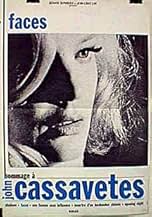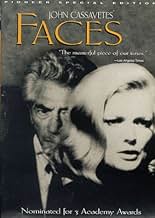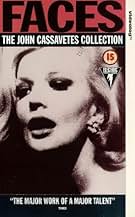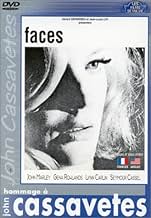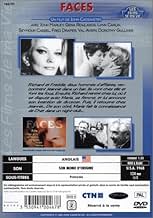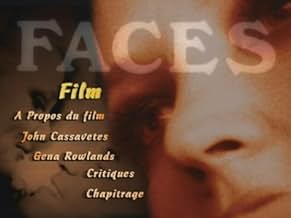Füge eine Handlung in deiner Sprache hinzuA middle-aged man leaves his wife for another woman. Shortly after, his ex-wife also begins a relationship with a younger partner. The film follows their struggles to find love amongst each ... Alles lesenA middle-aged man leaves his wife for another woman. Shortly after, his ex-wife also begins a relationship with a younger partner. The film follows their struggles to find love amongst each other.A middle-aged man leaves his wife for another woman. Shortly after, his ex-wife also begins a relationship with a younger partner. The film follows their struggles to find love amongst each other.
- Für 3 Oscars nominiert
- 5 Gewinne & 9 Nominierungen insgesamt
- Comedian
- (as George Dunne)
Empfohlene Bewertungen
The film has moments of great pain because miniature struggles are so real and they tend to be vocalizations of a person's deeper fears in social interactions and in the structure of life. The film has scenes of furious drama because characters will experience blind unleashing of their ids as middle-aged people. Faces also delivers highly during moments of happiness and fun because, the situation's comfort level gracefully allowing, the characters will show the fieriest, grandiose, extroverted parts of themselves.
The movie's message, ironically, is not about the inner self and the unleashing of it but about the naiveté with which people carry out their normal married lives and don't care to face their flaws and problems and, though they gradually strip their personalities down bare throughout interactions, they continue not knowing themselves or each other. Faces is now among my favorite films of all time and places John Cassavetes on a pedestal as an idol of mine. The movie is a supreme demonstration of powerhouse acting, wherein each performance can be cherished by the performer with a feeling of ownership. There is a bit of real actor in each character played, and that can be seen in each and every powerhouse scene in a row.
Cassavettes must have been repulsed by the insincerity of the people who were surrounding him when he wrote Faces. Few films have so many moments where characters are together but not talking to each other. They are merely talking, or laughing, or singing, doing anything they can to avoid having to confront the other person. Only once, when the young lover boy talks about the mechanical nature of people in America, do we even get any hint that the filmmaker is put off by the behavior of his characters. The rest of the time he merely films them and shows us what they do. This unsentimental approach can leave the viewer feeling a bit odd, but it works very well in the end. By seeing these character's shortcomings without any hint of disapproval from the filmmaker, the viewer is forced to consider their own lives and the people around them. It allows for an honesty not found in any, I repeat ANY other American film of the 1960's. Even Who's Afraid of Virginia Woolf has some indications of Nichols' attitude towards the material. Faces is just the facts.
I can only imagine the excitement that people interested in film must have felt upon the release of this film. Here was a personal, Bergman-esque film made about American people living American lives. (Note: Bergman is referenced during the film.) The quiet desperation of the housewife, the empty feeling inside the businessman, the false nature of each and every relationship speak volumes about the reality of American family life. How refreshing it must have been to see these topics approached in an American film.
The film's style is notable as well. It is independent in every sense of the word. It uses a fluid camera, freeform acting, and natural lighting. In many ways, it paved the way for a lot of the young filmmakers of the 1970's by providing them with a stylistic freedom that Hollywood had previously ignored. Today, it appears as a fairly standard film in terms of style, but at the time it was groundbreaking and exciting. In fact, it retains that excitement today, although the real revelation is how much has been taken from the film and used by others.
Faces is a great movie experience. Anyone frustrated with the lack of real connection in their lives should see it, if only to realize that many others are suffering from the same fate.
This film, I would say is another one of those indie films (sort of foreign-filmmaking- esque) from how it is much ado about NOTHING. I love these films. They are like a breath of fresh air. That, and they always seem so personal. I wonder if it was actually scripted or if it was improvised like most Cassavetes projects.
The only work I have seen of Mr. John Cassavetes was his depute film, Shadows, which was mainly all improve, or so he says in his interviews. I take a strong liking to these films because of how slow they are, yet SO INVITING; so UN-American, if you will. - People have said that Cassavetes brought the indie film movement to the states. So far I have not been proved wrong so far. His films, such as Faces, are all so unique and timeless. Like literally, I believe this movie will be studied until THE END OF TIME.
I like seeing people celebrating. It is nice. Gives one the feeling of calmness; like nothing extreme is happening so we don't have to waste any time stressing about it. Does that make sense?
Our main protagonist, Richard Forst (played by John Marley), is a (so called) businessman who has an affair with a much younger woman. Little does he know that his wife has some plans of her own.. You can really tell what kind of man Robert is when he says:
"I'm just a mild success in a dull profession, and I want to start over again. And I've got a bad kidney!"
This just shows what kind of person he is as he says it to the younger girl, Jeannie (played by the beautiful Gene Rowlands).
I really like the acting and love the struggles and conflict that this husband and wife go through. Both are trying to find happiness in so many ways, but is only making it worse for themselves. .
-- Michael Mendez
Wusstest du schon
- WissenswertesWhile filming a part on Bob Hope Presents the Chrysler Theatre (1963), John Cassavetes saw Steven Spielberg lurking around the set, as he was then in the habit of doing. Cassavetes approached Spielberg and asked what he wanted to be. When Spielberg replied he wanted to be a director, Cassavetes allowed the young man to direct him for the day. He later invited Spielberg to work on this film with Spielberg serving as an uncredited production assistant on Gesichter (1968) for two weeks.
- Zitate
Maria Forst: There's a Bergman film in the neighborhood.
Richard Forst: I don't feel like getting depressed tonight.
- VerbindungenFeatured in Cinéastes de notre temps: John Cassavetes (1969)
- SoundtracksLove Is All You Really Want
Written by Jack Ackerman
Top-Auswahl
- How long is Faces?Powered by Alexa
Details
Box Office
- Budget
- 275.000 $ (geschätzt)
- Weltweiter Bruttoertrag
- 7.236 $
- Laufzeit2 Stunden 10 Minuten
- Farbe
- Sound-Mix
- Seitenverhältnis
- 1.66 : 1


